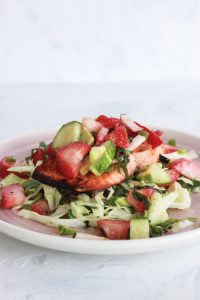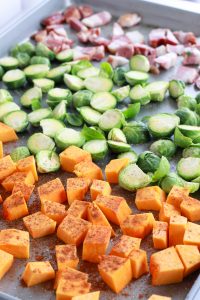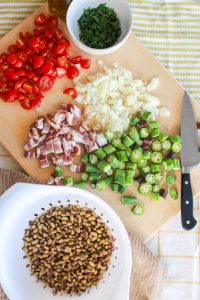What to Eat to Influence Your Genes
In my last post, I caught you up to speed on the concept of epigenetics and why the food you eat gives you the keys to editing those undesirable genes. So you’re probably wondering what to do with this information, and how to practically leverage this good news? Or maybe you skipped the back story and just want me to tell you what to eat, and that’s fair too. Here’s a list of key foods that will help you take control of your health:
Key Foods for Healthy Gene Expression
Ligands
Ligands are molecules that binds specifically to a receptor site of another molecule, and in the case of DNA, can alter gene expression of pro-inflammatory genes and pro-inflammatory transcription factors. This means they can act to block the genes that may otherwise promote inflammation in the body, one of the major underlying factors of disease. They include the following bioactive food compounds:
Omega-3’s
- fatty fish such as salmon, mackerel, tuna, herring, sardines (best sources of EPA and DHA – especially good if you’re a female of reproductive age to help regulate hormones!); flaxseeds, chia seeds, walnuts, leafy vegetables, some grass-fed animals. If you’re supplementing, try to get about 500 mg each of DHA and EPA per day through high-quality fish oil.
Vitamin A
- Sweet potato, spinach, carrots, beef liver
Vitamin D
- Trout, salmon, mushrooms, cod liver oil (supplementation may be necessary if you don’t get frequent sun exposure)
Phytonutrients
Compounds in food rich in antioxidants and found to protect against disease – best way to get a variety is to eat colorfully!

- Curcumin from turmeric (if you can’t stand the taste, try supplemental form)
- Isothiocyanates and sulforaphane from cruciferous vegetables like brussels sprouts, broccoli, cabbage, cauliflower
- Resveratrol from purple grapes, red wine, nuts
- Genistein from soybeans*
- Organosulfur and quercetin from onion and garlic
- EGCG from green tea
- Luteolin from celery, parsley, cabbages, peppers, broccoli, and other plants
- Monoterpenes in citrus fruits, cherries, and herbs
- Lycopene from sun-dried tomatoes, fresh tomatoes, guava, watermelon, and other fruits
*there’s still a lot of controversy around soy, but for now, I prefer to sources that are fermented (such as miso), organic, and unprocessed (like edamame)
Methyl-Rich Foods

The second part is a methyl-rich diet, which means getting enough of the micronutrients folate, vitamin B12 & other B Vitamins, specifically 2, 3 and 6, choline, and betaine. The addition of methyl groups to DNA bases have been found to contribute to long-term gene expression, as much as 2 generations. The way you eat today may literally affect your grandchildren!
Folate
- Leafy green vegetables, beans, peas, lentils, fruits like lemons, bananas, and melons
B-Vitamins
- Meat, whole grains, eggs, dairy products, legumes, nuts, dark leafy vegetables, and fruits (citrus fruits, avocados, and bananas)
Choline and Betaine
- Fish, poultry, eggs, cruciferous vegetables, and dairy products
Bottom Line
So as you can see, there’s no “magic formula” to epigenetics- I could have just said “eat more fruits, vegetables, seeds and fish” and left it at that, which you probably already knew (and sounds a lot like the Mediterranean diet, eh? More to come on that). But sometimes you need to know the why behind health advice before you’re convinced to start making changes. So next time you’re planning your meals for the week, think like an artist. More color and variety= healthy gene expression! Check out a few of my favorite ways to incorporate these ingredients:
- Chile Lime Salmon with Strawberry Mint Salsa
- Fresh Herb Frittata
- Vegan Spring Greens Pasta
- Winter Greens & Radish Pesto Pizza
- Tuna Tapenade Cucumber Crostini
Sources:
Mahan, K., Raymond, J. (2017). Krause’s food and the nutrition care process. (14th ed.). St. Louis: Elsevier.
CATEGORY
9/29/2021
POSTED
What to Eat to Influence Your Genes
Cozy + Conscious Fall Recipe Collection
Enter your name and email to download this FREE eBook of over 40 recipes highlighting seasonal produce to make healthy eating a no-brainer when cooler weather hits!
Subscribe
Submit
COMMENT LOVE